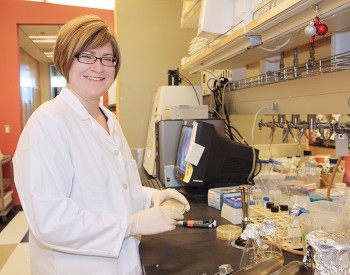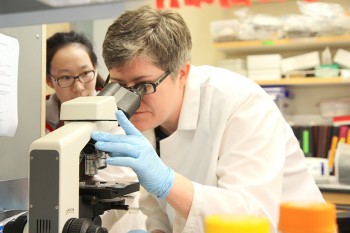Postdoctoral Fellow - Ophthalmology, Microbiology, and Immunobiology
Harvard Medical School - 2012

Kelli Palmer
Cecil H. and Ida Green Chair in Systems Biology Science
Professor - Biological Sciences
972-883-6014
BSB 12.542
Google Scholar page
ORCID
Not currently accepting undergraduate or graduate students
Professional Preparation
Ph.D. - Molecular Genetics and Microbiology
University of Texas at Austin - 2008
University of Texas at Austin - 2008
B.S. - Microbiology
University of Oklahoma - 2003
University of Oklahoma - 2003
Research Areas
Research Interests
I study antibiotic resistance in pathogenic bacteria. My lab currently studies three areas:1) How antibiotic resistance genes spread among microbes on mobile genetic elements;
2) How CRISPR-Cas systems encoded naturally in the human microbiome alter the spread of antibiotic resistance genes; and
3) How pathogenic bacteria construct their outer surface and dynamically alter its structure in response to chemical stresses imposed by the human host.
Publications
Factors affecting CRISPR-Cas defense against antibiotic resistance plasmids harbored byEnterococcus faecalislaboratory model strains and clinical isolates 2025 - Other
Factors affecting CRISPR-Cas defense against antibiotic resistance plasmids harbored by Enterococcus faecalis laboratory model strains and clinical isolates 2025 - Other
Factors affecting CRISPR-Cas defense against antibiotic resistance plasmids harboured by Enterococcus faecalis laboratory model strains and clinical isolates 2025 - Journal Article
Enterococcus faecium: evolution, adaptation, pathogenesis and emerging therapeutics 2024 - Journal Article
Streptococcus agalactiae glycolipids promote virulence by thwarting immune cell clearance 2024 - Journal Article
Erratum for Joyce et al., “Comparative Genomics of Streptococcus oralis Identifies Large Scale Homologous Recombination and a Genetic Variant Associated with Infection” 2024 - Journal Article
Awards
-
Outstanding NS&M Teacher Award - [2017]
News Articles
Microbiologist Aims to Thwart Antibiotic Resistance
 Dr. Kelli Palmer is running her own laboratory as an assistant professor of molecular and cell biology at The University of Texas at Dallas. Her work focuses on a better understanding of how bacteria develop resistance to antibiotics. One approach she is taking involves sequencing entire genomes of different bacterial species to identify and characterize genetic mutations that lead to antibiotic resistance. She also is investigating the role genetic material called plasmids and transposons play in conferring resistance. These tiny bits of DNA often encode antibiotic resistance genes, and they can be transferred from bacteria that are drug-resistant to bacteria that are not. Understanding this process might lead to more effective ways to curtail the spread of antibiotic resistance, Palmer said.
Dr. Kelli Palmer is running her own laboratory as an assistant professor of molecular and cell biology at The University of Texas at Dallas. Her work focuses on a better understanding of how bacteria develop resistance to antibiotics. One approach she is taking involves sequencing entire genomes of different bacterial species to identify and characterize genetic mutations that lead to antibiotic resistance. She also is investigating the role genetic material called plasmids and transposons play in conferring resistance. These tiny bits of DNA often encode antibiotic resistance genes, and they can be transferred from bacteria that are drug-resistant to bacteria that are not. Understanding this process might lead to more effective ways to curtail the spread of antibiotic resistance, Palmer said.
Biologist Investigates How Gene-Swapping Bacteria Evade Antibiotics
 A scientific peek into bacteria boudoirs is revealing how “sex” among disease-causing microbes can lead different species or strains to become resistant to antibiotic medications.
A scientific peek into bacteria boudoirs is revealing how “sex” among disease-causing microbes can lead different species or strains to become resistant to antibiotic medications.Dr. Kelli Palmer, assistant professor of biological sciences at The University of Texas at Dallas, is conducting research aimed at understanding the underlying mechanisms by which bacteria acquire antibiotic resistance genes from one another.
NIH Funds Dr. Palmer’s $2.4 Million Project
 Dr. Kelli Palmer received $2,467,449 from the National Institute of Health (NIH) for her research on Adaptive Alterations of Lipids in Mitis Group Streptococci. Streptococcus mitis is typically found in the human mouth and causes infections in the bloodstream and heart valve. Dr. Palmer’s research will test her theory that the ability of Streptococcus mitis to drastically alter lipid compositions in the cellular envelope is critical for its habitat flexibility in the host and its survival in response to antimicrobial stress.
Dr. Kelli Palmer received $2,467,449 from the National Institute of Health (NIH) for her research on Adaptive Alterations of Lipids in Mitis Group Streptococci. Streptococcus mitis is typically found in the human mouth and causes infections in the bloodstream and heart valve. Dr. Palmer’s research will test her theory that the ability of Streptococcus mitis to drastically alter lipid compositions in the cellular envelope is critical for its habitat flexibility in the host and its survival in response to antimicrobial stress.